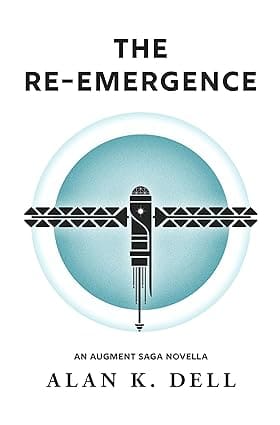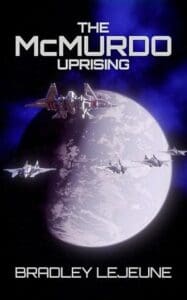
Synopsis
A strange probe from a long-forgotten satellite network appears in the P’hori star system. Its message: a dire warning signalling the return of an ancient mythological evil. Imperator Da’kora Corasar and the crew of the Qesh’kal are sent to determine the probe’s origin, and find that the satellite is not as they had expected. Corasar trusts the satellite’s data, but not everyone aboard agrees. Tensions rise and loyalties are tested as they track down the source of the signal. Thrust into conflict, the crew of the Qesh’kal must chase their foe across the galactic arm and save their home from certain destruction.
Review
I read THE RE-EMERGENCE for the SFINCS semi-finals with team Fanfiaddict. This review only represents my personal opinion and does not reflect the entire teams thoughts. Since reading and reviewing, it’s made finals- congratulations! Thank you for reading.
I can’t talk about THE RE-EMERGENCE without first talking about how it ends.
I often use novellas to try out an author’s writing style, a particular sub-genre, story concept, etc because it’s a shorter commitment compared to a full-length novel. Novellas that fit within a series, like this one does, often gives a tantalizing glimpse into a much larger story.
Dell capitalized at such an opportune moment– the epilogue– and from it emerged the foundation of another story that left me thinking about everything I just read. The ending that was a beginning sparked my curiosity to uncover the full scope of the world and its lore. I was left in awe and it was one of my favorite parts. In a matter of moments, I knew this was a story that I had to see continue in book one, FROM THE GRAVE OF THE GODS. Just a note- this novella was released months before book one, and as someone who reads in pub order, I believe it’s the intended place to begin.
It’s said that things often come in threes, and recently for me it’s been books that opened with a non-human perspective. Unit-17’s POV set things up so when we reach the first chapter, I liked that we knew something the characters didn’t. Dell expertly lays out fascinating pre-history in the prologue, setting the mood for the entire drama set in space.
Ah, first contact sci fi. I have always found these stories thrilling because of the possibility of encountering intelligent life beyond Earth. Aside from the excitement of the unknown, what I truly appreciated about the story’s first contact was how the advancement of technology came into play–the idea of a civilization “catching up”–and the depictions of the alien races. Substantial world building involved creating alien races– such as a bird-like alien race– with its own distinct morphologies, culture, and way of life. Engaging with the characters and the plot became easier once becoming familiar with the the new terminology and concepts (and thank you for adding a glossary at the end!)
The vastness of space and time, as well as the number of stories that are regarded as myths and legends, are some of the things this story makes me reflect on. Perhaps for something much older than us, what seem like millennia are only a few moments. And for the ancient wanderers in this story, there was no lost, forgotten history. That’s a bit chilling. Some aspects of the black forest of space were touched upon. This might be more relevant in book one. However, Dell delves into the themes of caution and uncertainty in interstellar encounters, along with potential approaches and outcomes.
The environment was used in two ways- to foster harmony and to create conflict. Anytime an AI is sentient, I’m in. There were moments when the tensions were tangible and connected to morality, loyalty, and duty. I always like to imagine what I would do myself. The action moved at a rapid pace, and by the time I knew it I had half the story finished.
Now, I think this is just me being me because no other reviews mention this at all, but one aspect I keep coming back to are the character’s internal thoughts. Being given a lot of the characters thoughts helped me understand them better and the situation in that moment but I like to see more of that translated into sensory descriptions or character dialogue. For example, when Sev wasn’t answering during a scene, Da’kora thought “He’s still not back with us? Either way, we need to get going. Something else to investigate!” or when Ashfan thought “It’s taking far longer than it should to translate this stuff… Is it even a language?” I’d love for some sensory feedback added in addition such as a chill creeping up their body, a deafening silence broken only by the audio crackling, throbbing at their temple with futile attempts to make sense of things, etc. I want to feel what they’re feeling like I’m there. Having more of this would’ve truly hit home for me.
Overall, I really enjoyed this first contact sci fi novella. Dell’s creativity, world-building,and plotting were strong. I needed a little more description included that focused on the senses. I am excited to continue the series and see where it leads.
I would recommend THE RE-EMERGENCE for fans of first contact sci-fi, those looking for themes of survival and resilience, and the play between technology and human nature.






I read and enjoyed this novella first too. It was the reason I went on to read his followup novel (From the Grave of the Gods), and his next between-novel novella as well (The Flight of the Aurora) and am really looking forward to his second full novel coming this year!